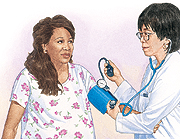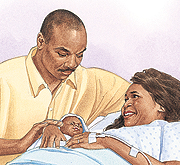Understanding Preeclampsia
Preeclampsia is a problem that may occur in pregnancy. Sometimes called "pregnancy-induced hypertension," it can lead to health risks for you and your baby. No one knows what causes preeclampsia. But it almost always goes away soon after you give birth.
Signs and Symptoms
A common sign of preeclampsia is high blood pressure. Other signs and symptoms include:
-
Edema (swelling) in your face or hands
-
Rapid weight gain-about 1 pound or more in a day
-
Protein in your urine
-
Headache
-
Abdominal pain on your right side
-
Vision problems (flashes or spots)

Your blood pressure will be monitored regularly throughout your pregnancy to help check for preeclampsia.
Tests You May Have
Your doctor will want to check your blood pressure throughout your pregnancy. If your blood pressure is high, you may have the following tests:
-
Urine tests to look for protein
-
Blood tests to confirm preeclampsia
-
Fetal monitoring to ensure that your baby is healthy
Treating Preeclampsia
Preeclampsia almost always ends soon after you give birth. The only cure is delivery. Until then, your doctor can help manage your condition. If your symptoms are mild, you may need bed rest at home. If your symptoms are severe, you will be hospitalized. Hospital treatment includes:
-
Complete bed rest to help control blood pressure
-
Magnesium IV (intravenous) drip during labor to prevent seizures
-
Induced labor or surgical delivery by cesarean section to help you have your baby more quickly
When to Call Your Doctor
Call your doctor or other healthcare provider if swelling, weight gain, or other symptoms come on quickly or are severe. Some cases of preeclampsia are more severe than others. Your signs and symptoms also may change or worsen as you get closer to your due date.
Who's At Risk?
Preeclampsia can occur in any pregnant woman. But if you've had it before, you have a greater chance of it recurring. Also, if you already had high blood pressure before getting pregnant, your risk for preeclampsia is higher. African Americans, teens, women over 40, and women pregnant with two or more babies are also at greater risk.
Dangers of Preeclampsia
If not treated, preeclampsia can cause problems for you and your baby. The placenta (organ that nourishes your baby) may tear away from the uterine wall. This can lead to fetal distress (the baby is at risk for health problems). Or, your baby may be born too early or too small. Preeclampsia also can cause these health problems:

Once You Give Birth
In most cases, preeclampsia goes away on its own soon after you give birth. Within days, your blood pressure should decrease. Other signs and symptoms of preeclampsia also will go away soon.

